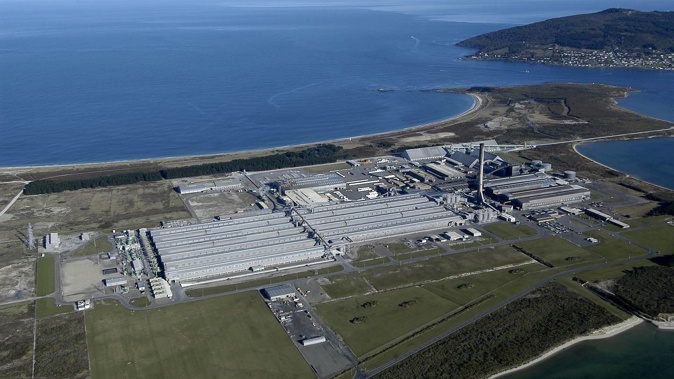
The owners of the Tiwai Point aluminium smelter say they have reached a deal with electricity provider Meridian Energy that will keep it open until the end of 2024.
While neither Meridian nor Rio Tinto have given details of the deal, Contact Energy has revealed that it has stepped in to provide Meridian some of the electricity the smelter requires.
Separately, the Government is in talks with Rio Tinto over transmission charges, which could see the smelter's charge for the use of the national grid reduced. Rio Tinto and the Government said the talks continued.
Today's announcement delays the likely closure of the smelter, Southland's largest employer and New Zealand's largest single user of electricity, by at least three years.
"The extension provides certainty to employees, the local community and customers while providing more time for all stakeholders to plan for the future," Rio Tinto, the majority owner of the smelter, said in a statement.
"While discussions with the New Zealand government are progressing in relation to their commitment to address the smelter's high transmission costs, a new agreement has been reached with Meridian Energy in relation to power prices, making the smelter economically viable and competitive over the next four years."
Energy Minister Megan Woods and Finance Minister Grant Robertson welcomed the deal, but gave no details about the status of the ongoing talks over cutting Rio Tinto's transmission charges, which would come in return for a plan to remediate the site when the smelter closes.
"Understanding the extent of the environmental impact of the smelter and removal of toxic waste from this site remain a bottom line for the Government," Robertson said in a statement.
The news has significant implications for both Southland and the New Zealand electricity market, much of which is owned by the Government and the public through Kiwisaver accounts.
While the news secures around 1000 jobs it may not be welcomed everywhere, with Rio Tinto's repeatedly lobbying for special treatment for the smelter making it the target of criticism.
"We are pleased to have reached an agreement with Meridian Energy that will enable the Tiwai Point smelter to continue producing some of the lowest carbon aluminium in the world," Rio Tinto Aluminium chief executive Alf Barrios said.
"This agreement improves Tiwai Point's competitive position and secures the extension of
operation to December 2024. It also provides Rio Tinto, the New Zealand government, Meridian, and the Southland community more time to plan for the future and importantly gives our hard-working team at Tiwai and our customers the certainty they deserve."
Meridian Energy confirmed the deal, without revealing details. It is to hold a teleconference next week, the company said.
"We have worked hard to provide solutions that we believe were of lasting value to the Smelter and acceptable to our shareholders. We're pleased that Rio Tinto has accepted this offer, which will now provide certainty for the Southland community," chief executive Neal Barclay said in a statement to the NZX.
"As a company we have planned for the eventual exit of the Tiwai Smelter. We're excited about the opportunities that we have to accelerate decarbonisation, and we're actively developing new growth opportunities."
Contact Energy meanwhile revealed it had agreed to supply Meridian Energy with a portion of the electricity required to power the smelter.
"Contact will provide an average of 100 megawatts of baseload electricity through until the end of 2024 (assuming the smelter requires 572 megawatts of electricity)," the company said in a statement to the NZX.
"This is great news for Southland and New Zealand, global carbon emissions, and Contact's shareholders," Contact chief executive Mike Fuge said.
"We are pleased to have played our part in helping secure the financial sustainability of the unique low-carbon smelter at Tiwai and retain the 1,000 high-paying jobs in Southland and the 1,600 associated contractor and supplier roles too," Fuge said. "Many other jobs around New Zealand would also have been lost if there was a disorderly exit."
While all of the electricity generators were seen to be impacted by the outcome of the Tiwai negotiations, this was especially the cast with Meridian and Contact, which both have generation in the lower South Island which could have been stranded if the closure came before transmission upgrades.
Threats to leave, again
In late 2019 the smelter, majority-owned by Anglo-Australian mining giant Rio Tinto, announced it was seeking talks with the Government, warning it needed tens of millions of dollars of relief from transmission costs and electricity prices.
The news kicked off lobbying and negotiations between the electricity sector, Government and Rio Tinto, with Rio Tinto's global head of aluminium, Alf Barrios, travelling to Wellington in December 2019 to warn Finance Minister Grant Robertson and Energy Minister Megan Woods the threat of closure was real without relief.
Although the Government convened a meeting of the industry, the efforts to find a compromise appeared to have failed when New Zealand Aluminium Smelters announced in July that it was planning to close its operations in mid-2021.
Prior to the election National and later Labour announced they wanted to work with the smelter's owners to try to extend the life of the smelter for at least a few years.
Take your Radio, Podcasts and Music with you









